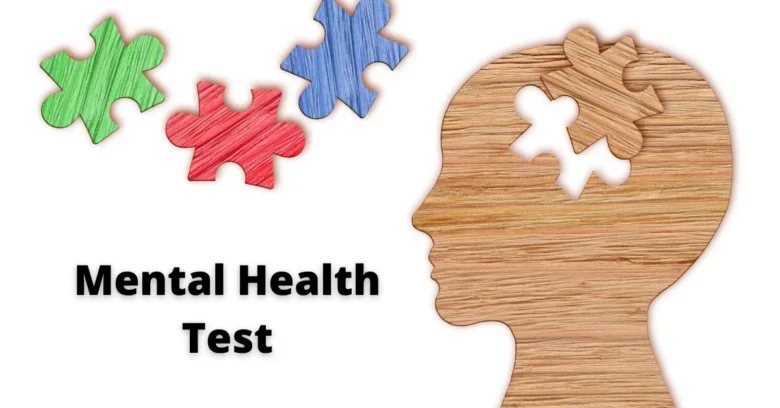test mental health In the realm of mental health care, the path to well-being is a collaborative journey between individuals and healthcare professionals. Here, we explore the various facets of this process, from the initial mental health assessment to ongoing reviews, highlighting the importance of open communication, self-advocacy, and a supportive network.
The Mental Health Assessment: A Compassionate Conversation
A mental health assessment serves as the cornerstone of effective care. It is not a test but a dialogue between the individual and a diverse team of healthcare professionals, encompassing nurses, social workers, psychologists, and psychiatrists. This comprehensive discussion covers a spectrum of topics, from symptoms and experiences to personal strengths, fostering an environment where openness and honesty pave the way for tailored support.
test mental health Bringing Support Along: The Power of Advocacy
Advocates, whether volunteers or professionals, represent the individual’s interests. The assessment delves into various aspects, including relationships, cultural background, substance use, and past experiences, ensuring a holistic understanding of the individual’s needs.
test mental health Empowering Individuals: Active Participation in Care
As the assessment concludes, individuals are empowered to actively participate in decisions about their mental health care. Clear communication and understanding are paramount, and healthcare professionals are dedicated to explaining the assessment, diagnosis, and treatment options in a language that resonates. Information to take home, along with guidance on additional resources, equips individuals to reflect on their mental health needs in their own time.
test mental health Periodic Reviews: Adapting to Evolving Needs
Recognizing that needs can change over time, the mental health care journey includes regular reviews. A named care coordinator ensures continuity, offering support and assistance. Reviews can take place in familiar settings, and the flexibility to include friends, family, or advocates fosters a comprehensive understanding of the individual’s situation.
Navigating Challenges: Speaking Up for Effective Care
test mental health Should challenges arise with a particular treatment or service, individuals are encouraged to speak up. Open communication about concerns ensures that adjustments can be made, potentially involving new assessments or alternative approaches. If concerns persist, seeking a conversation with the manager of the mental health service provides an avenue to explore different professional support.
test mental health Creating a Resilient Path Forward: A Collective Effort
In summary, the mental health care journey is a collective effort, requiring active participation, open communication, and periodic reflection. Individuals, supported by their care coordinators and networks, play a crucial role in shaping their mental well-being. Together, these collaborative efforts pave the way for a resilient and adaptive approach to mental health care.
Building Resilience: The Continual Pursuit of Mental Well-Being
The pursuit of mental well-being extends beyond individual assessments and reviews. It involves an ongoing commitment to building resilience and adapting to the dynamic nature of mental health. Here are key considerations as individuals navigate the various stages of their mental health journey:
test mental health Self-Advocacy and Empowerment
Active participation doesn’t end with the assessment; it’s an ongoing process. This involves staying informed about available treatments, asking questions, and expressing preferences. By actively engaging in decisions about their care, individuals become partners in the collaborative effort towards improved well-being.
test mental health Cultivating a Supportive Network
Friends, family, and advocates contribute significantly to the individual’s mental health journey. Engaging them in discussions, reviews, and decision-making processes strengthens the overall support system. Open lines of communication within this network foster understanding and empathy, creating a foundation for sustained resilience.
test mental health Exploring Holistic Approaches
Mental health is interconnected with various aspects of life, including physical health, relationships, and daily circumstances. test mental health Embracing a holistic approach involves recognizing these connections. Individuals are encouraged to consider the impact of lifestyle, nutrition, and physical activity on their mental well-being. Exploring complementary therapies or activities that bring joy and relaxation can contribute to a more comprehensive approach to mental health care.
test mental health Harnessing Technology for Support
In the contemporary landscape, test mental health technology can play a valuable role in mental health care. Mobile apps, online resources, and telehealth services offer additional avenues for support and information.
test mental health Celebrating Progress and Setting Goals
Acknowledging progress, no matter how small, is integral to maintaining motivation and resilience. Regularly celebrating achievements, setting realistic goals, and revisiting aspirations contribute to a positive mindset. Mental health professionals and care coordinators can assist individuals in establishing milestones and creating a roadmap for their journey.
Embracing Growth: Navigating Challenges with Resilience
The journey towards mental well-being is marked by its capacity to evolve, adapt, and embrace growth. As individuals navigate challenges, they are encouraged to cultivate resilience and explore additional avenues that contribute to their overall mental health. Here are further insights into this continual pursuit:
test mental health Mindfulness and Emotional Well-being
Integrating mindfulness practices into daily life can be a powerful tool for enhancing emotional well-being. Techniques such as meditation, deep breathing exercises, or mindfulness-based activities can assist individuals in managing stress, fostering self-awareness, and building emotional resilience. Mental health professionals may provide guidance on incorporating these practices into one’s routine.
Education and Mental Health Literacy
test mental health Empowerment through knowledge is a fundamental aspect of the mental health journey. Mental health literacy equips individuals with the understanding needed to make informed decisions, reducing stigma, and promoting a more open and supportive community.
test mental health Community Engagement and Advocacy
Active involvement in community initiatives and mental health advocacy contributes to a broader understanding of mental health issues. Individuals can participate in or support community events, raise awareness, and advocate for improved mental health services. This collective effort not only strengthens community bonds but also helps in breaking down societal barriers surrounding mental health.
test mental health Creativity and Self-Expression
test mental health Exploring creative outlets can serve as a powerful form of self-expression and therapeutic release. Whether through art, writing, music, or other creative endeavors, individuals can channel their emotions, reflect on their experiences, and find solace in the process. Creativity can be a valuable companion on the journey towards self-discovery and healing.
test mental health Lifelong Learning and Adaptation

This involves remaining open to new insights, adapting to changing circumstances, and proactively seeking opportunities for personal development. Lifelong learning fosters resilience and equips individuals with the skills to navigate various life stages.
Collaborative Reflection and Goal Setting
Regular reflection, test mental health both independently and collaboratively with mental health professionals, supports individuals in assessing their progress and refining their goals. Setting realistic and achievable objectives ensures a sense of purpose and direction. Mental health care remains a collaborative effort, and ongoing communication facilitates adjustments to the treatment plan as needed.
Fostering Connection: Building a Supportive Ecosystem
Individuals are encouraged to foster meaningful connections with various elements that contribute to their well-being. Here are additional considerations to enhance the supportive environment:
test mental health Social Connectivity and Relationships
Strengthening social bonds and maintaining healthy relationships play a pivotal role in mental health. Open communication, empathy, and a supportive social network provide a crucial foundation for emotional well-being.
test mental health Peer Support and Shared Experiences
test mental health Engaging with peer support groups or communities where individuals share similar experiences can offer a sense of understanding and solidarity. These forums provide spaces for exchanging coping strategies, insights, and encouragement. Shared experiences can reduce feelings of isolation and foster a sense of belonging.
test mental health Nature and Physical Activity
Spending time outdoors, engaging in regular physical activity, or simply immersing oneself in natural surroundings can have positive effects on mood and overall well-being. Integrating these elements into one’s routine contributes to a holistic approach to mental health.
Holistic Therapies and Alternative Approaches
Exploring holistic therapies, such as acupuncture, yoga, or massage, can complement traditional mental health interventions. These approaches focus on the interconnectedness of the mind and body, promoting relaxation, stress reduction, and overall balance.
Digital Well-Being and Boundaries
In the age of digital connectivity, test mental health maintaining a healthy relationship with technology is essential for mental well-being. Setting boundaries around screen time, practicing digital detoxes, and being mindful of online content contribute to a balanced approach. Ensuring that technology serves as a tool for support rather than a source of stress is key.
Crisis Planning and Safety Nets
While proactive measures are crucial, having a crisis plan in place is equally important. Collaborating with mental health professionals to develop a plan for managing crises ensures a proactive approach to potential challenges. Identifying safety nets, including emergency contacts and available crisis intervention services, adds an additional layer of preparedness.
Empowerment Through Advocacy
test mental health Becoming an advocate for mental health extends beyond personal well-being. This can involve sharing personal stories, participating in awareness campaigns, and advocating for improved mental health policies. By actively engaging in advocacy, individuals contribute to creating a more understanding and supportive community.
Conclusion: A Journey of Growth and Discovery
The mental health care journey is not a linear path but a continuous exploration of growth and self-discovery. Embracing the collaborative efforts of healthcare professionals, support networks, and individuals themselves fosters an environment where resilience can flourish. By integrating these considerations into their approach, individuals can navigate the complexities of mental health with strength and purpose, creating a foundation for lasting well-being.
Also Read:
Duck77 Login & Create An Account Duck77.com

